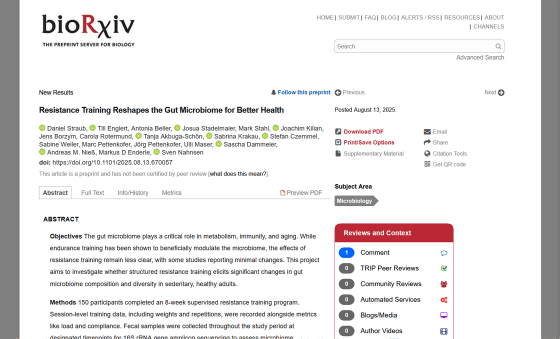Strength training may change your gut microbiome in just a few weeks

Strength training has been shown to be
Resistance Training Reshapes the Gut Microbiome for Better Health | bioRxiv
https://www.biorxiv.org/content/10.1101/2025.08.13.670057v1

Does resistance training really improve your gut microbiome?
https://theconversation.com/does-resistance-training-really-improve-your-gut-microbiome-265221
The intestines are home to a large number of different bacteria, fungi, viruses, and other microorganisms known as the intestinal flora. These microorganisms break down food that the human body cannot digest on its own, allowing us to absorb more nutrients and vitamins. In addition, some bacteria live in greater numbers in the intestines of people who are physically and mentally healthy, producing compounds that are thought to support health.
The composition of the intestinal flora is not constant, but varies depending on diet, age, sleep quality, exercise habits, etc. Therefore, a research team at the University of Tübingen in Germany conducted an experiment in which subjects who do not normally exercise underwent strength training to examine how the intestinal flora changes.
The study involved 150 sedentary participants who performed strength training two to three times per week for eight weeks. They were given the choice of either light weights and high repetitions (15 to 20 repetitions) or heavy weights and low repetitions (8 to 10 repetitions). The strength training program included chest presses , abdominal crunches, leg curls , leg presses , and back exercises, with two sets of each.
Both the high- and low-repetition groups demonstrated improvements in muscle strength and body composition at the end of the eight-week program.The researchers collected stool samples before the program, four weeks after the program began, and eight weeks after the program began to track how the participants' gut microbiomes changed.

The degree of muscle strength improvement varied from subject to subject in the experiment. The research team classified subjects who had the most muscle strength improvement from before the experiment as 'high responders' and subjects who had the least muscle strength improvement as 'low responders,' and analyzed these groups together with changes in the intestinal microbiota.
The results showed that the high responders had significant changes in their gut microbiota that were not seen in the other groups: 16 types of bacteria increased and 11 types of bacteria decreased in the high responder group.
Particularly significant increases were observed in
The researchers did not confirm an actual increase in butyrate in the stool samples, but rather reported an increase in the bacteria that produce butyrate. Furthermore, the study also found a decrease in bacteria generally associated with good health and an increase in bacteria associated with poor health, highlighting the diversity of the gut microbiome.

This study only showed the relationship between strength training and changes in the intestinal flora, but it is unclear whether there is a causal relationship, such as 'strength training caused changes in the intestinal flora' or 'changes in intestinal bacteria led to improved muscle strength.'
Although the subjects were instructed not to change their diet during the experiment, it is possible that strength training prompted them to unconsciously change their diet, which in turn contributed to the benefits of strength training and changes in their gut microbiome.
Please note that the paper has only been published on a preprint server and has not yet gone through a formal peer review process.
Related Posts:
in Science, Posted by log1h_ik







